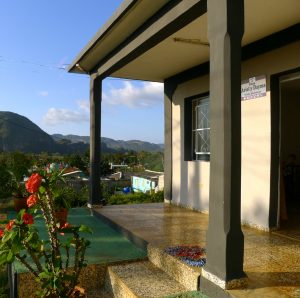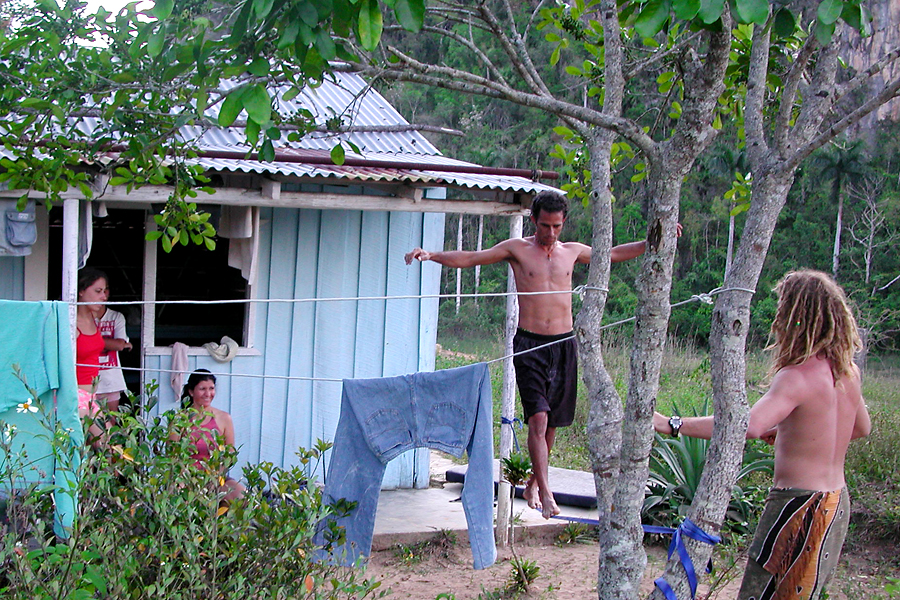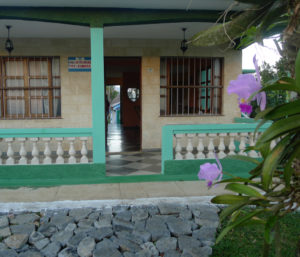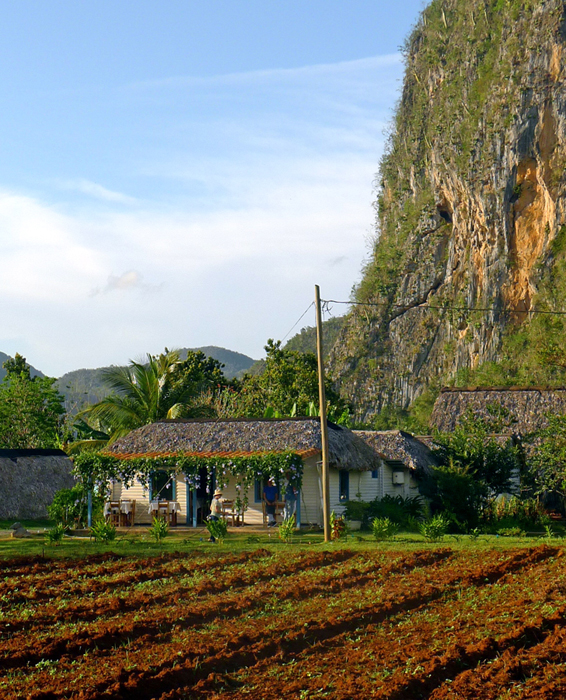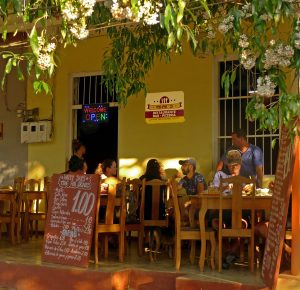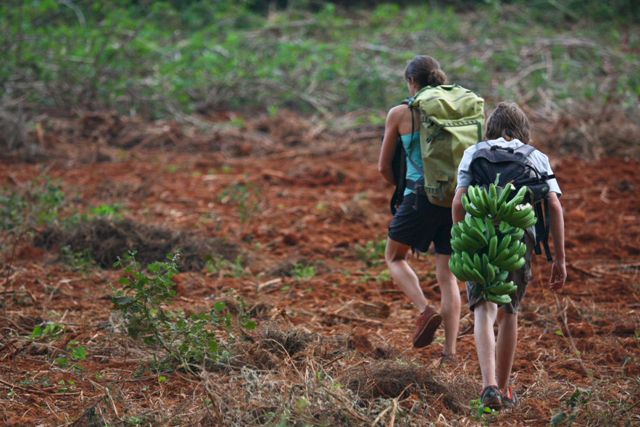Contents
Cuba’s Real Options
It is not an over-simplification to say that there are two styles of travel in Cuba. Your choices are 1) government-run or government-joint venture-run hotels and restaurants or 2) the network of private homes and eating places. These are known as “casas particular” and “paladares”—the Cuba equivalent of bed-and-breakfast, about as close to budget-travel as there is in Cuba. The paladares are like restaurants in most of the world.
Camping isn’t practical—unless you will be with all your gear, all the time. Camping may work if bike touring. Government says a tourist visa permits staying in its hotels or licensed casas particular. No camping, staying at a house or even setting up your tent in the yard of Cuban house that is not licensed to rent.
In Cuba, no matter what the name of the hotel, restaurant, or store, almost everything is owned by the state. Hotels and restaurants are run by government employees or government-selected employees, even if operated by a joint venture between the government and a foreign company. Many hotels in Havana and at beach resorts are built and operated by foreign companies, although still owned by the Cuban government. These at least are well run and provide reliable, if expensive places to stay.
In general, hotel maintenance is very poor, the service worse, and the food only more so. After so many tourists revolted, most resort hotels switched to buffets, so that you do not have to wait for the mediocre food.
Some hotels are in beautifully restored historic buildings, such as the classic Hotel Nacional, Palacio O’Farrill, and hotels Florida and Raquel. Viñales has two spectacularly situated hotels, La Ermita and Los Jasmines, on the ridges overlooking the entire Valle de Viñales. A stay at any of these can be special—but skip the food and prepare for lackluster service.
Restricted range of options extends to the range of prices as well. Hotels are expensive, charging prices for accommodations one or two stars higher elsewhere. starting at about 100 CUC and over to $300 in Havana with few low-budget choices.
Probably government or government-joint ventures are sustained only by the package deals offered to large tour operators and the reluctance of many people to stay in private homes.
Casas Particular and Paladares
Cuba’s charm is its people. The easiest way to meet them is to stay in the homes of Cubans who rent rooms. These are called casas particular, and most any casa particular is better than a government hotel.
A paladar is a restaurant in a private home. It can be anything from a handful of tables in the dining room of a small house to a beautifully restored colonial house with high ceilings and candle-lit tables, serving haute cuisine. Paladares compare favorably with good restaurants around the world. Even when availability may limit the menu, the Cubans working in paladares are welcoming and enthusiastic.
Since permitted in 1993, casas particular and paladares have become commonplace in most tourist areas and major cities. However, do not expect to find casas and paladares in non-tourist other areas. The same will be true, however, of government hotels and restaurants.
Casas particular will have decals on the door or wall. Current one looks like an upside down anchor. Just knock and ask. Usually even easier than that. The casas will be the best painted and attractive houses on the block. In Viñales, the owners give houses names, usually including the words “Casa” or “Villa”, as in “Villa Rosa”.
Initially the accommodations at casas particular varied widely. In the 1990s, casas were host’s own rooms that the family would decamp for the night. However, even these cramped, intimate arrangements provided lasting memories and insights into the realities of Cuban life. (Do not kid yourself: even the sparsest casa particular was not, “living as the Cubans do.” Not even close.)
Today, the surviving casas have built or rebuilt rooms and baths solely for guests, and added heated showers, air conditioning, and separate, private baths, entrances, and terraces for guests. A few now have televisions, “mini-bars,” refrigerators, and pools. Most rent more than one room or even an entire house.
Staying in a casa particular in Cuba is not the same as a bed and breakfast elsewhere. Cubans are accustomed to large family settings and share whatever they have with family, friends, and neighbors. When you are their guest, they seem naturally to accept you as another family member or neighbor. Very often, once a traveler has stayed at a casa particular, personal relationships are formed. Photos and letters are exchanged. Friends are referred.
Camping
For years, we have have been telling climbers, don’t ask about camping. It’s an enormous effort and misses the enchantment of Cuba. The response of most climbers is, “Yeah, but where can we camp?”
For them, there is “Casa Gringo”, a cave-camp established by Craig Luebben and Cameron Cross on their route, Mr. Mogote. To find it, walk or hitch four kilometers east of town, locate a trail through the jungle to the base, and then complete a 40-meter free-hanging jumar to the cave. Free and no camping limits.
There is a campismo outside of Viñales. It is a compound of small, sparse bungalows. Sometime no lightbulbs; never any toilet paper. In Cuba, campismos are popular with Cubans on weekends, but might be deserted, even closed, during the week. To make this option workable, you’ll likely need a car or a bike.
Some climbers have camped on farms or stayed with Cuban climbers. If you do, however, you should be aware that you are putting them at risk. Cubans are obligated to obtain permission from the Ministry of Immigration before a foreigner can stay with them, even if they are related, as in husband and wife. The authorities in Viñales enforce this to the hilt. Thanks to the network of local Committees For Defense of the Revolution, Immigration will know if a foreigner stays in a home or camps in a yard and presume that the visitor is paying for accommodations. Denials are ignored. Nothing happens to you, but your host will face stiff fines.
The Role of Commissions
So many of our transactions are facilitated by commissions that we may not be conscious of them. Orbitz or Expedia earn a commission when you book a room or rent a car. Likewise Amazon on our purchases. The convenience may be worth it to you.
Free enterprise in Cuba has brought with it the commission system for everything from rooms, paladares, taxis, and many of the things you buy. You will find that the casa where you are staying will happily find a taxi, horseback ride, tobacco, almost anything that is sold privately. Just note how often on sites such as Trip Advisor, guests heap praise on casa owners who helped with all bookings, taxis, tours, etc.
No doubt they helped, but they also earned a commission on each. Usually you benefit and receive a service that facilitates your travel and saves you time and hassle. You didn’t have to go out, locate, select, and negotiate for your horseback ride or tour. A taxi was at the door when you wanted.
Simply be aware that you are paying for that convenience. And that it may influence which ride or tour you take and the price.
A casa in Havana will help you find a casa in Viñales and taxi to take you there. The Viñales casa must pay a commission to the Havana casa. The usual rate is the equivalent $5 USD for every day of your stay in Viñales. The driver must kick back part of the fare to the Havana casa as well. If the taxi driver talks you into switching to a different casa, he gets the $5 USD per day instead of the casa in Havana.
Since most visits start in Havana, commissions from other casas are a recurrent source of income for casas in Havana. Same for the taxis that run daily from Havana to Viñales and Trinidad.
A casa sets up a horseback ride. There’s a commission. The ride takes you to ranchon for lunch. Commission back to the casa. You go to a campesino’s house and buy hand-rolled artisan cigars. Commission to casa.
Some commissions are so customary that they are built into the standard rate. Almost all taxis and rides are arranged by someone; its now part of standard rate. You’d probably pay same for a horseback ride or taxi to the beach if you arranged it yourself. But maybe you’d be able to buy boxes of artisan puros at a discount if you walked up to house on your own.
Pre-covid, this scene happened daily in Viñales: A bus arrives filled with visitors. Most have arranged their rooms, and often their hosts are there to meet them. One of the many aggressive “jineteras”, however, talks them into going to a different house. She will earn $5-per-day if she succeeds. She will promise any rate, rooms, meals necessary; it’s not her house she’s offering. After the guests walks a few kilometers, and the new casa owner says absolutely “No” to the promised rate or meals, what are the visitors going to do? Walk back to town, dragging their bags, maybe in the heat, and start a new search? Go back to the casa originally committed to but then dumped? (To the promiscuous guest, the jilted home owner may justifiably say, “no thank you.”) Or give in and pay more or accept less than their original booking?
There are times when the commission costs you a lot. A casa may usually charge $25, but accept 20 or even 15 from someone, such as a climber staying a week or more. But not if she must pay a Havana casa or taxi driver $5-a-day. That is $5-a-day she can’t offer to you as a discount. For a 10 day stay in Viñales, $50 will go to a casa in Havana or a taxi driver. But not as a discount to you.
A few tips.
– If you have selected your casa in Viñales based on this website, Trip Advisor, or a guidebook, make that clear to the casa in Havana or taxi driver. The Havana casa may call ahead for you as a convenience. But let the casa in Viñales know that you picked it yourself. The casa owner then knows that there is no commission going to another casa or the taxi driver that brings you.
– Careful that the taxi driver doesn’t rush ahead to talk to casa owner and maybe claim he’s bringing you and will come back later for the commission. Havana taxi drivers may show up months later to “pick up” their commission.
– Most casas will recommend an alternative if they are already booked during your stay. The other casa may pay a commission for the referral. So many casas in Viñales now rent, however, that more often the referral is to a family member or next door neighbor who also rents. They probably don’t charge commission to a sister or daughter.
– Some casas never turn down a reservation, nor tell you that they are booked and plan to place you with someone else. There are some well-know and highly-rated casas that earn more from commissions than renting. Oscar Jaime’s house is part of climbing history in Viñales and extolled in a dozen articles. Oscar doesn’t say no to a reservation requests; always finds a good alternative; and will be paid a commission.
– Taxi drivers are as notorious as jineteros at trying any gambit to persuade a visitor to switch. They’ll drive you in circles and claim your casa is far away. They’ll say that your casa very bad or dangerous.
– And our pet peeve: when visitors switch casas, they don’t tell the original casa owner. They switch and don’t show up. They should, of course, go tell them that changing to another casa. Watch how quickly a driver or jinetera changes if they hear, “let’s first go the place I’ve reserved and then I’ll go to the place you want.” If you go to the casa you’ve reserved and don’t like it, that’s different. It rarely happens. Usually, the gullible just switch and leave the first casa owner waiting. Guests miss buses; taxis break down. Guests arrive late every day in Viñales. Responsible casa owners will not rent the room to someone else when guests may be late. Casa owners only have a room or two, nots hundreds of rooms to bear the loss of a no-show.
Private vs. State-run Restaurants
Paladares stand apart from state-run restaurants. State-restaurants must accept the food delivered from the government distributors. Little delivery, little availability; rotten lettuce in the truck, rotten lettuce on the plate.
Almost worse for customers, employees in state restaurants and hotels appear to stop trying once they’ve worked their way up the ranks, and the government gives them a coveted job in the tourism industry. A conundum to understand. Perhaps, it’s, you won the lotto. It’s yours, and they can’t take away.
La Cocinita del Medio in Viñales may serve the most tender yuca (a tuber that is a staple in the Cuban diet). They get it from a single farm which they believe produces the softest yuca because it grows in the reddest soil. El Olivo sends a car to shop in Havana several days a week. One of the owners of El Cuajaní flies to Miami frequently, shopping for ingredients.
A state restaurant couldn’t take those initiatives for a dish or a complete menu.
Paladares have varied menus, fresh foods, and earnest service. A paladar can buy wholesome foods direct from farmers — por la izquierda or the black market. Several in Viñales, such a El Olivo and El Cuajaní have their own farms. Everything is fresh.
Unlike casas particular, paladares don’t have symbols at the door. A paladar may even have “restaurant” in its name. The difference will quickly be obvious. In Viñales, at the corner of Salvador Cisneros and Adela Azcuy there is a restaurant. Most nights it’s vacant. Chairs stored for night on top of tables by 7pm. It’s one of the three state restaurants in town.
Most paladares stick to a standard fare of “cocina criollo”, indigenous Cuban food. It’s mostly variations of black beans, rice, and meat.
Preparing Your Own Food
There may be no better insight into the reality of life for Cubans than to feed yourself for a few days or a week.
Finding food to prepare meals in Cuba is time consuming. It can be done, as the owners of casas and paladares do every day—if that is how you want to spend your days in Viñales.
There are couple of stores in Viñales. Even if you shopped at each of them, you’d have a hard time putting together a complete breakfast or lunch, let alone cook dinner. Cereal but no milk one day; vice versa the next. Butter is in for a couple of hours; then not again for a week. Rum and cigarette usually. Eggs, chicken, cheese, or milk, almost never.
Eggs, meat and other staples require asking around. “I heard a farmer near El Palmar killed a pig.” No web-searches. It’s on your feet, bike, or motorina to chase down rumors about what might be for sale. Cubans see a queue of people, and rush to ask what’s available. If it’s 20 lb boxes of chicken, they buy one, and eat chicken for a while.
Bread is a challenge. The two local bakeries put bread on sale 3 or 4 times a day, seemingly according to the bakers’ whims. There will be up to 50 people waiting for bread. Don’t be fooled if they are spread out, sitting around outside bakery. No one will be in a line. Bread goes on sale, and a perfect line forms according to when each person arrived. It is “el ultimo” system that has evolved from long hours waiting for everything from food to buses.
If you are very lucky, you may bump into one of the bread vendors, who spend most of their days in bread lines, and then peddle around town selling bread for a peso or two more than the bakeries.
Fortunately as of 2023, Viñales has two or three private bakeries. They struggle to get wheat and sell bread every day, but on many days, one of them will have good bread.
Fruits and vegetables are obtained from varying street vendors, and are the easiest snack and lunches to buy. Juices are home-squeezed and rarely in stores.
The government does not allow wholesale distribution. The casas and paladares buy from the same stores and vendors as everyone else. Usually they pay an under-the-table “premium” to get what they need.
An unexpected consequence of Viñales’ casa-paladar capitalism is that they now buy-up all the beer—not unimportant after a hot day of climbing. Before covid, the stores rarely had the most popular beer, Cristal and the stronger-tasking Bucanero. But at least the casas and paladares, who were buying them before either hit the store shelves. You paid a little more in the casa or paladar, but not the mark up in rest of world, and still good, cheap beers, always served very cold.
During covid the government either stopped producing Cristal and Bucanero or exported some or all. Both disappeared for three year and haven’t been for sale, even on black market, despite the resurrection of tourism. A few of the enterprising Cubans who fly back and forth to countries such as Panama bringing goods Cubans can’t buy from stores, have started “importing” Cristal and Bucanero back to Cuba for resale on the black market. A little more than double the price, but best beer in Cuba for the money. And at equivalent of $2.50 USD a can is a good price anywhere.
Costs
In 2021 and 2022, Cuba suffered ballooning inflation. The government kept everyone on payroll during covid, probably by printing more money. Then desperate to earn foreign hard currency to buy goods (since domestic agricultural production is so throttled that Cuba imports 60-80% of all food), it ended the quota of food provided to Cubans, and instead put almost all food for sale in stores that required Cubans and visitors to pay with debit cards funded exclusively with foreign currencies. Cubans get paid only in pesos and could get currencies only on the black market. Printing money and a huge demand to buy foreign currencies dropped the value of the peso by 700%. See our page on currency for our best attempt at an explanation.
As a result it’s difficult to estimate, let alone forecast prices. This is the territory of Yogi Berra’s saying, “It’s tough to make predictions, especially about the future.” But keeping in mind another axiom, the best predictor of the future is the past, (possibly), these are pricesbefore covid.. The prices below are U.S. dollars. which compared to the Cuban pesos has been stable. Our best guess is that the past price in U.S. dollars will be the best predictor of future prices.
Casas are $25-50 in Havana. In Viñales, prices start as low as $7 to $10 a day and the nicest places are $20 to $25 day. Most casas prices are for the room. Two or more people, same price. But owner may balk if abused, such 4 in a double.
You can negotiate at your casa. They aren’t experienced in the art of the deal. Be reasonable. Offer something for discounts, such as a longer stay or eating meals at the casa.
Meals at casas have become problematic. It’s a struggle for owner to put a decent breakfast on the table. If you want some dinners at your casa it should be discussed at the beginning. Owner may be hesitant or need advance notice.
Meals were $7-10 in casas; breakfast $3 to 5. In general the cheapest stay is if you negotiate to include all your breakfasts..
The key is to negotiate it upfront. Don’t whine when checking out—“I only drank the coffee and left the bread, fruit, and eggs on the table.”
Casas rarely do a la carte, where you order only what you want at each meal. If coffee and fruit in the morning or salads for dinner is all you need, everyday, you should negotiate for that upfront. Casa owners are wary of guests who pay for breakfast or dinner for one, and then split the meal between two or more people.
Even when a casa has an available kitchen, don’t automatically expect to cook your own meals, without a deal with the proprietor. They know the difficulty of buying foods and expect that you’ll start asking to borrow whatever you can find.



